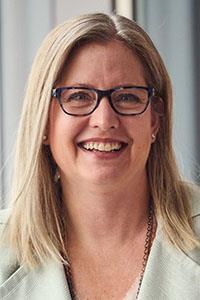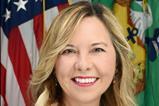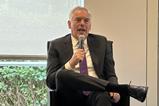Melanie Sponholz, chief compliance officer and director of responsible investing, portfolio operations at Waud Capital Partners, was named Compliance Mentor of the Year at the 2024 Excellence in Compliance Awards. She spoke with Compliance Week about her mentoring philosophy, the ways she connects with other professionals, and the importance of influence to the compliance function.
Q. You’re a popular speaker on the compliance event circuit, including appearances at our National Conference and Women in Compliance Summit. How much do you value those opportunities to share your experiences with the compliance community?

A. I really enjoy speaking. I like the energetic exchange of live presentations.
One of the reasons I like being in compliance is that I like and am curious about people. We all get heads down in our day-to-day life, we’re busy and stressed out about different things, and you forget that everyone else is feeling the same way. And there’s this cool thing that happens when you present where you can feel people making that connection and thinking, ‘Somebody else has that same thing going on.’ They can also feel other people having that same moment all around them. It’s a great reminder that we’re all having the same thoughts and experiences.
There’s something about that live interaction that you don’t get in a Zoom call or email. When you have the chance to be in a room with people, it creates that connection that is just as valuable as whatever the content is.
Q. What are some ways you try to replicate that connection in your interactions with peers and colleagues?
A. I mentor people outside of Waud as well, but the way I work with our group is we have a virtual meeting every Friday with all the compliance leaders from our portfolio companies. Then we all have each other—everyone shares best practices. We also have an in-person symposium once a year in Chicago.
My immediate team—they happen to be in New Jersey and I’m in Pennsylvania, so we try to meet in the middle (Princeton). We get together once a month in person to keep that going.
The other folks I tend to coach more, we set up monthly Zoom calls and make sure we’ve got that going on the calendar.
Q. How much do you integrate your personal interests into the connections you have with other compliance professionals?
A. You do your best coaching or mentoring when you get to know someone. As you develop that relationship, it’s great to get to know what makes them tick outside of work. If someone is feeling stuck professionally, sometimes you need to pull back and figure out where you are not feeling stuck and how can we pull some of that energy into work.
There’s this book called ‘The Artist’s Way’ by Julia Cameron on how to rediscover your creativity. One of her tenets is that you have to create a container. For example, she has you do these morning pages where you’re supposed to just stream of consciousness three pages of writing to get your day started. You think, ‘I don’t have anything to talk about for three pages,’ but once you start writing, it comes out. The point is that’s your container—you’re holding that space every morning to do that.
When I commit to writing something or speaking, that’s creating a container for me. It keeps me creative to have those things on my calendar. I try to preach that while I’m coaching, too, and say, ‘How can you hold some space for yourself and not necessarily make it compliance related? How can you block some time in your week or day and use it to get your creative juices flowing?’
You will find that translates into unstopping your professional blockages, too. You’ll see that life is bigger and your brain still works—it’s just not cooperating in that one area. I think it all ties together.
More Excellence in Compliance Awards
- CCO of the Year: Gina Nese stays ahead of the curve
- Compliance Program: Revamped compliance at Albemarle
- Lifetime Achievement: Compliance lessons from a ‘Flea’
- Compliance Innovator(s): Creative engagement approach drives Johnson, Sudo
- Rising Star: Q&A with Giovanni Corrado
Q. One of your nominators said this about you: “Melanie is the kind of mentor that can foresee your future before you can even picture it! … Not only is she thinking in the present with you, dissecting ideas or discussing short-term goals, but she also kindly and confidently pushes you further, paints the future or your career path, and sees your potential before you even do.” How do you respond to that praise?
A. It’s so nice to have somebody think that.
Sometimes you just need that coach or mentor to help you get out of your own way. You can’t see the forest for the trees because you’re so in your own stuff that you’re not seeing your potential and the big picture. It’s nice to have someone who can say, ‘OK, let’s step back from this immediate situation and not forget all your talent and strengths and how we can use those so that you can take your next step.’
Some of it too, in all honesty, is age. When you’ve been working for 30-something years, you get some perspective in life. It’s helpful.
I’m a very straight shooter. When people are struggling with something or a role they’re in, I’ll be the first person to tell you you’re not going to find rainbows and unicorns somewhere else. There is no perfect place, so the question is are the imperfections something you are willing to work with.
The other thing is to remind people you always have agency. You always have choices and options. You can be the change agent or things will change on their own. That’s the beautiful thing about life—you need to remember you’re not going to stay stuck.
Q. How did the people who mentored you contribute to your viewpoint?
A. The people I would consider mentors have done different things for me.
Some of them are great connectors, like Ellen Hunt. She is one of those people who no matter what you are trying to find information about, she will know someone and connect you with them immediately.
I had another mentor early in my career—back when I was in publishing, before I ever went into healthcare or compliance—that taught me the value of having a confident leader who’s not afraid to let you shine. Everyone I’ve ever mentored, there’s an area where they know more than I do about something, so it’s a two-way street. You never want to hide someone else’s light; you want to magnify it for them if you can. That was a great lesson for me.
One of the things about teaching or mentoring is you have to give knowledge when someone wants knowledge. You have to find someone who’s looking to make that connection so you’re not just piling your advice on someone who’s not looking for it. There are a lot of different ways to be a good mentor, and if I’m lucky I can do all of it here and there because I’ve had all those great experiences to learn from.
Q. Your nomination also mentioned your ability to influence leaders at your company as well as those under you in the compliance department. How important is that skill to the presence of compliance in the company and support for the function?
A. It’s crucial. It ties back to curiosity being helpful. If you can remember to be curious about why someone else’s perspective is different from yours, it can really help you figure out how to reframe to connect with them.
I think listening is a highly underrated skill. If you can listen to understand and not to respond that will go a long way. When you’re talking to your CEO or another leader, you need to understand their perspective if you’re going to influence. You need to communicate we’re both trying to get to the same finish line. Where you get lost is when you get into the black-and-white thinking and ‘it’s my way or the highway.’ You have to be able to regroup and understand what is in it for them to communicate in a way that is going to get a better result.
That influence, especially in compliance, is critical. You’re always asking people who don’t work for you to do things, so you have to get them to want to do it.
Q. What’s the best advice you have for up-and-coming compliance professionals?
A. Be a perpetual learner. Yes, you need to keep learning about compliance because regulations change every 10 minutes—that’s why you need to go to conferences or read news publications—but you also need to be curious and keep learning about other things, too. Learning about the things that inspire and capture your attention and imagination will translate into innovation and passion for your work.
Also, be a good listener. You’re going to have to get along with all kinds of people and understand people very different from yourself that you need to collaborate with. Try to understand other people’s values and goals.


















No comments yet